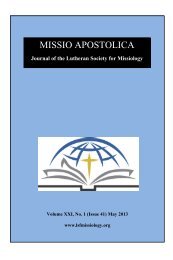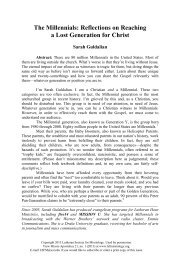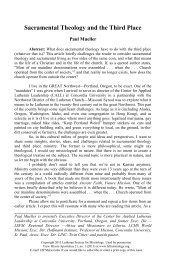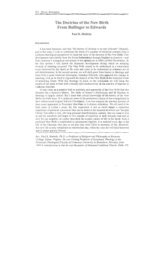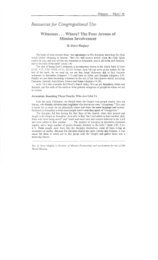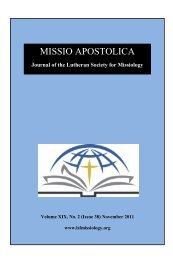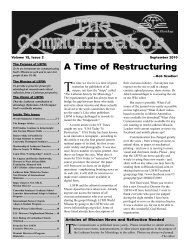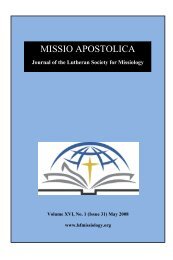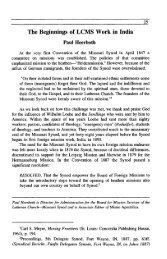Reflections of a New Missionary - Lutheran Society for Missiology
Reflections of a New Missionary - Lutheran Society for Missiology
Reflections of a New Missionary - Lutheran Society for Missiology
You also want an ePaper? Increase the reach of your titles
YUMPU automatically turns print PDFs into web optimized ePapers that Google loves.
92 Missio Apostolica<br />
and with His perspective. As the new translation <strong>of</strong> the Book <strong>of</strong> Concord will remind us,<br />
Luther actually wrote "Was ist das", "What is that" not "What does it mean" The<br />
catechism expresses actual facts, not interpretations, <strong>of</strong> the Christian faith.3 Creator God<br />
is not distant (as is a common theme <strong>of</strong> folk religion). Rather He is the Father, who<br />
creates and provides <strong>for</strong> all believers as His chldren; with no need <strong>for</strong> intermediary<br />
saints, ancestors or spirits. Jesus Christ is victor through His sacrificial death and<br />
resurrection over sin, death and the devil. No evil spirit in the woods, no witch, nor any<br />
other spirit, can overpower Jesus. Not even consequences in daily life which might lead<br />
to death need be feared, because death itself is no fear; no need <strong>for</strong> magical protection<br />
charms or indulgences. The Holy Spirit calls, gives life and identity to God's people, His<br />
family, which is the church. He enables them to live as children <strong>of</strong> God. These are but a<br />
few <strong>of</strong> the applicable themes <strong>of</strong> the Small Catechism to the worldview <strong>of</strong> folk religion. In<br />
addition, the Laxge Catechism is a veritable treasure trove <strong>of</strong> com<strong>for</strong>t <strong>for</strong> the soul coming<br />
out <strong>of</strong> folk religion. For example, Luther is quite firm about Christ's rout over sin, death,<br />
and the dew1 in the explanation <strong>of</strong> article two <strong>of</strong> the Apostle's Creed.<br />
The <strong>Lutheran</strong> Worldview<br />
What we rarely, if ever, speak about is the commitment to a specific worldview that'<br />
unconditional subscription to the <strong>Lutheran</strong> Confessions involves. Very specific beliefs<br />
(see "belief systems," p. 39) about God, man, sin, salvation, sacraments, life, death,<br />
heaven, hell, etc., all <strong>of</strong> which guide practice, are put <strong>for</strong>ward by the Confessions.<br />
Unconditional subscription means promising not to adopt or mix in another worldview in<br />
doctrine and life. A conditional subscription, or a viewpoint which holds the Confessions<br />
as historical documents with which one may or may not agree, is likely caused by<br />
scruples based on enlightenment or evolutionary models <strong>of</strong> society, religion, history and<br />
the like. These models are the very Western presuppositions which Understanding Folk<br />
Religion complains provided underpinnings <strong>for</strong> missionary theology and practice to<br />
weaken the Gospel message and allowed the syncretization <strong>of</strong> public Christianity and<br />
private paganism (Chapter 1). The Confessions were written by the re<strong>for</strong>mers <strong>for</strong><br />
themselves and <strong>for</strong> their fellow Christians coming out <strong>of</strong> folk religion into God's<br />
marvelous light, and they did not understand God's light as bound to their time.<br />
<strong>Lutheran</strong> Theology Is Prepared, Are We<br />
A little more evidence from Understanding Folk Religion <strong>of</strong> how the <strong>Lutheran</strong><br />
church ought to be prepared to minister to souls in folk religion: The authors bemoan the<br />
typical evangelical smorgasbord <strong>of</strong> theology, and suggest the "overlooked" use <strong>of</strong><br />
catechisms (p. 253). Confessions are recommended to standardize beliefs <strong>for</strong> longer<br />
periods <strong>of</strong> time (p. 253). It is even argued that catechisms and confessions can provide a<br />
foundation <strong>for</strong> the next generation's revival. Standardized "rituals" (liturgy) is pr<strong>of</strong>itable<br />
'See Gottfried G. Krodel, Append~x <strong>of</strong> "Luther's Work on the Catechism in the Context <strong>of</strong> Late Medieval<br />
Catechet~cal Literature," CJ25:364-404.




